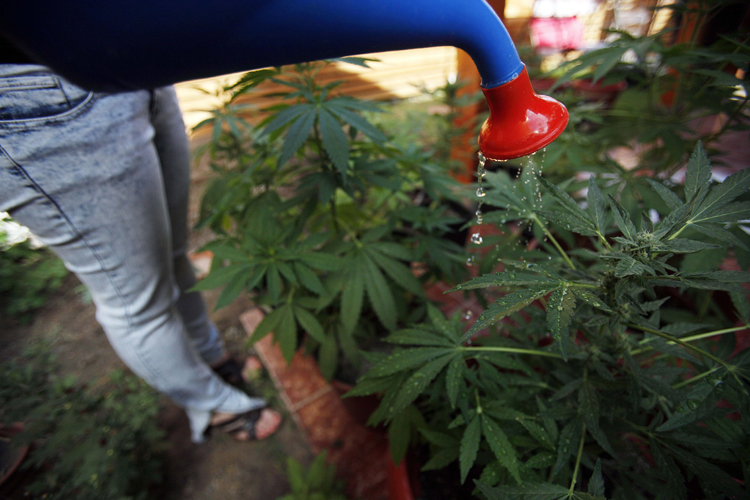Toronto-based True North Seed Bank sells every kind of marijuana seed you could possibly want.

You can choose seeds that will grow short plants, tall plants, plants with lots of THC or only a bit, blue, white, red or purple plants, plants bred to grow outdoors, indoors or in greenhouses, plants with effects from “talkative” to “uplifting” to “tingly.”
There are over 2,000 varieties for sale, sourced from 60 different breeders.
Is there a catch? Well, sort of.
“We’re selling them for souvenir purposes only,” company spokesperson Brandon May explained. “Once they’re in somebody’s possession, it’s up to them what they do with it.”
Seed variety Taiga #2 (which “delivers a very powerful and long-lasting effect that is great for creativity and reliably good yields”) seems like an expensive souvenir at US$55.99 for three seeds. I say so; May sticks to his guns.
“We sell them as souvenirs for heirloom genetics,” he said. “A lot of people like to hold on to their genetics, and have a collection.”

- Attack on Iran triggers global flight disruptions, impacts Canadian travellers
- WWE Hall of Fame ring belonging to wrestling legend recovered after stolen
- Carney calls for protection of civilians as U.S., Israel strike Iran
- Quebec politician praised for speaking openly about menopause symptom in legislature
Legalization of recreational marijuana is happening in part because governments have given up trying to ban pot: “Even with the criminal sanctions, it’s been ridiculously hard to control,” said Rosy Mondin of the Cannabis Trade Alliance of Canada.

Get weekly health news
For one thing, it’s fairly benign, as mind-altering substances go; for another, it’s not that hard to produce. You don’t need access to a still, or a lab, or shady connections on other continents. A basement, a patio or a lonely corner of a woodlot will do.
Commercial-scale grow-ops with hundreds of plants have escaped detection, and it’s much easier to hide three or four. And if some buds get sold on the side, rather than smoked by the grower, it’s hard to see why anybody would be the wiser. Banning home production would just make it harder to see, rather than controlling it in any real sense.
The federal commission that’s designing Canada’s legal recreational pot rules has acknowledged that it needs to figure out what to do about home production, and asks organizations sending it submissions to have their say on the issue.
READ: Toronto’s vanishing grow-ops fall victim to pot economics
U.S. states that have legalized recreational marijuana have handled home grows differently. Colorado allows six plants per person, with half flowering at any given time. Some Colorado municipalities limit the number of plants per household; Denver, for example, limits homes to 12 plants. Washington state, however, bans home recreational growing.
In Oregon, which has rules similar to Colorado’s, some home producers have started growing enormous plants to get around the state’s four-plant limit, Mondin says.
“In Oregon, they’re like trees. The diameters of the trunks are quite amazing.”
In Canada, medical marijuana users have been able to legally grow their own pot (or have someone else do it for them) since August. Health Canada was forced to develop rules after a court decision in February.
READ MORE: Canadians will soon be allowed to grow their own medical marijuana
In its submission to the task force, the Canadian Medical Association took a dim view of home production:
“There are many health and safety hazards in cultivation, such as high humidity and temperatures, risk of fire, as well as the use of hazardous chemicals, including pesticides used for the control of fungi, bacteria and insects. There is little quality control regarding contamination and potency of the product. As well, home cultivation has an enhanced risk of abuse, if individuals use the production for sale rather than exclusively for personal use.”
The Cannabis Trade Alliance, on the other hand, favours a system like Oregon’s. A permissive approach to home grows, the organization argues in its submission, would tend to undermine the black market.
“If the government intends on removing organized crime from the cannabis trade as much as possible, allowing cannabis to be grown at home should be part of the program.”
“If you don’t allow for home production just like we allow for home production for wine, it’s going to continue to push it underground,” Mondin said.
READ: 4,000 illegal marijuana plants seized from Health Canada licensed grow-op in Ontario
If legal marijuana sales follow a liquor store model and are a government monopoly, home grows will pose an interesting problem. It might be tempting to try to suppress them as a threat to revenue (much as home production of distilled spirits is illegal).
But another approach would be to accept that home grows will always be with us, make lemons into lemonade, and go into the seed business.








Comments
Want to discuss? Please read our Commenting Policy first.